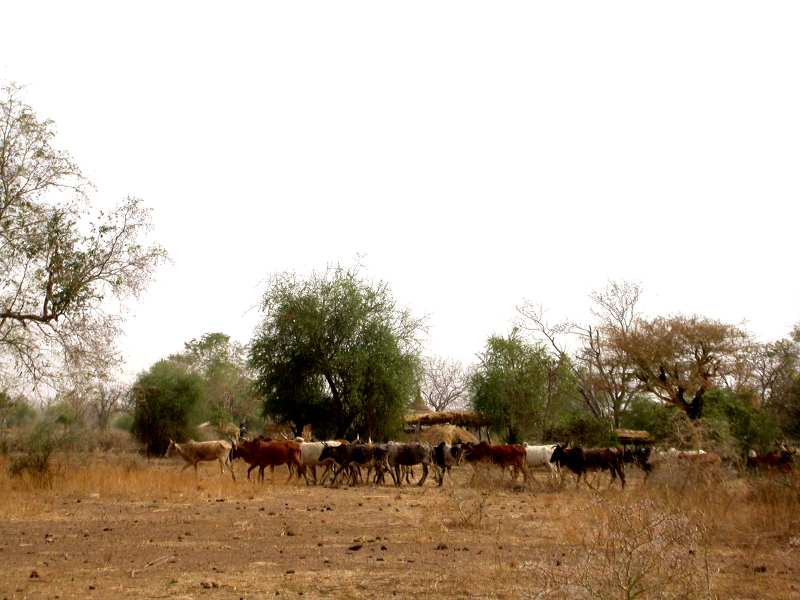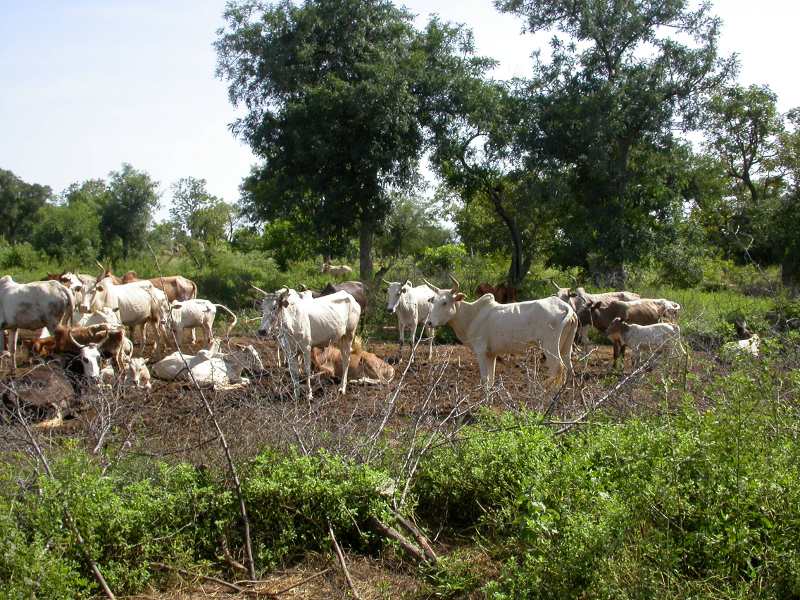Agribusiness and pastoralism do not go well together
Here is an extract of an inquiry published by ”L’Evènement of February 1st 2012. Since the beginning of 2000 the Burkinabè government has embarked on a policy of promoting agribusiness. The State encourages salaried employees and all those who can afford it to invest in agriculture. Agribusiness is seen as instrumental for the promotion of a modern competitive market integrated agriculture. However, the intrusion of new players in the rural world is not without consequence for the traditional ones.
Much at stake around the dam at Lou

 At Lou, a village less than 7 km from Sapouy, land problems have increased since a large dam was constructed for the development of market gardening. The competition for land is very rough. The so called new players, the agribusinessmen, have invaded the area around the dam. This is not without effect on the traditional users. ”Here the threats of eviction of pastoralists have become a reality.
At Lou, a village less than 7 km from Sapouy, land problems have increased since a large dam was constructed for the development of market gardening. The competition for land is very rough. The so called new players, the agribusinessmen, have invaded the area around the dam. This is not without effect on the traditional users. ”Here the threats of eviction of pastoralists have become a reality.
Since the construction of the dam in 2005 they keep chasing us away from one place to another. In 2009 they made us leave our homes to sell the land to agribusinessmen. This year they are around once again. They came to show a visitor, who arrived by car, a piece of land only 50 m from my house. I was sitting on the veranda and I heard them talk. There were four of them in the car. A guy called Pamoin brought them here” says Idrissa Boly, a farmer well into his sixties.
Just like other pastoralists Idrissa settled in the village in the 80ies. He stresses that he was there well before the revolution on August 4, 1983. Another man, Ousmane Boly, head of his family, talks of his betrayed hopes: ”We were told that the construction of the dam would be a relief for us because our animals would no longer suffer. Therefore we contributed a lot to make the work advance rapidly, providing the workers with meat and milk.But in the end everything was just the opposite of our expectations. It was the start of our misfortunes, we lost our homes, our fields and our pasture land and our cattle now have difficulties in getting to the dam. ”
However at the time of the construction of the dam, the village chiefs and the local council authorities granted the cattle farmers two good footpaths earmarked for their animals. But they sustain that these were never respected. The following year the market gardens had taken over the footpaths.The pressure on access to land is very high as a result of the dam. The cattle farmers went to the village chief to complain.
He marked out four new paths for the animals. But according to the owners these paths are so narrow that it would be difficult for a cart to pass through. To water their animals they have to go by the main Lou-Sapouy road with all the dangers that ensue, for the animals as well as for the herders.
The chief wanted to help us, but we have the impression that he cannot control the sellers. It is his brothers, children and grandchildren who are selling the land. The moment his son Kadidi sold the land on which they had lived for 20 years, this set off all the others who wanted to sell but who had been afraid”, Idrissa Boly confirms. In 2009 he and around ten other families were evicted from their homes without any compensation. Today there is manioc, bananas and tomatoes on that land. At present animal farmers at Lou live with the fear of a further eviction.
The problem is that now they no longer know where to go, they are already at the entrance of the forest. Environmental legislation in Burkina strictly forbids letting animals stay in the forest. Last November we learnt that the village chief had called a meeting, where both those who wanted to sell land and cattle farmers were present. He categorically forbade his brothers to venture going along with the farmers to sell more land. He also earmarked the footpaths previously taken over by the market gardening fields of the agribusinessmen. These different steps were welcomed both by the animal farmers and the local council, which goes to prove that the involvement of village chiefs can (Ed. note: sometimes) solve land tenure problems.
Idrissa Barry, L’Evènement,
Wednesday February 1st, 2012.
Read the full inquiry here









